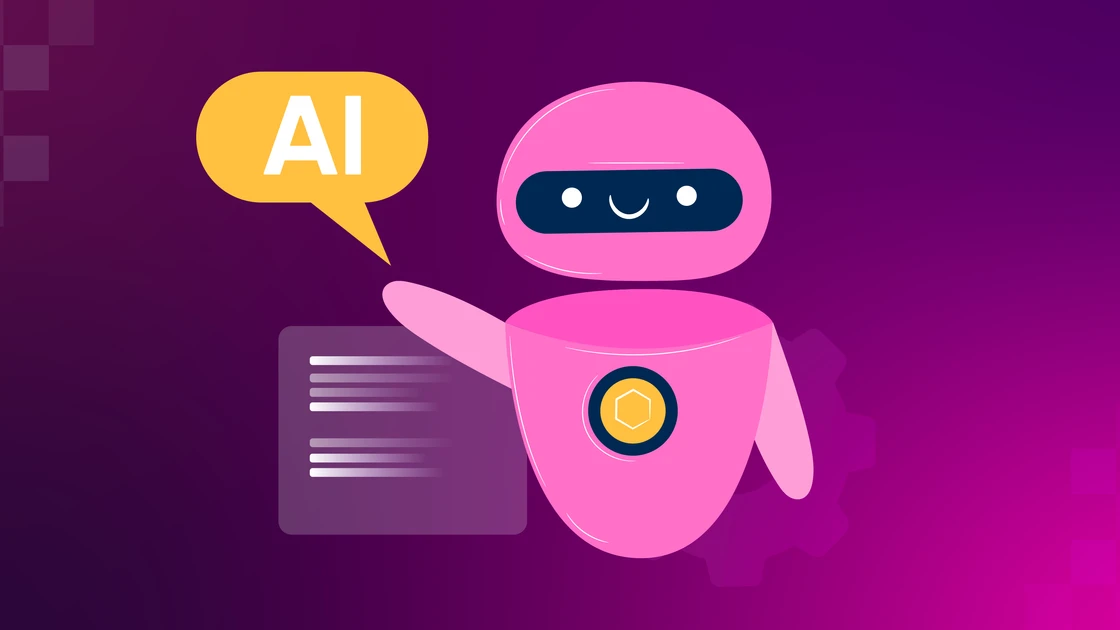What if AI could handle your whole goal from beginning to end? Not just help out, but take over behind the scenes, ensuring everything goes well and sticks to your aims without you always having to check in.
Sounds like a big promise, doesn't it?
That’s where agentic AI comes in. In the sections ahead, we’ll break down what agentic AI is, how it’s different from traditional AI, and most importantly, showcase real-world agentic AI examples that are already making a big impact across industries.
Whether you’re a business owner, developer, or just interested in exploring the future of AI agents, this blog will give you a clear picture of the most exciting agentic AI use cases and examples and what they mean for you.
Let’s dive in.
What Exactly Agentic AI is?
Unlike Generative AI systems that require step-by-step instructions or rely on direct input, agentic AI possesses goal-oriented autonomy that mimics the problem-solving and decision-making capabilities of a skilled human agent, yet at a greater scale and speed. How?
Agentic AI performs a series of actions to achieve target goals with limited human supervision while also handling complex tasks efficiently.
The result? Frees up human teams from repetitive and time-consuming processes, allowing them to focus on other important work and drive productivity and innovation.
As businesses race to automate, AI agents are redefining business intelligence and automation, offering a pathway to more intelligent and adaptive systems that can learn continuously and significantly improve performance over time.
Interested to know where and how agentic AI is being used? Let’s dig deeper into agentic AI examples and their real-world applications.
Top Agentic AI Examples and Use Cases
Agentic AI is already making a big difference, helping businesses get things done faster, support customers better, and simplify day-to-day operations. From smart assistants to decision-making tools, its impact is growing fast. Want to see how it’s being used in real life?
Let’s take a look.
Multimedia Content Creation
When it comes to multimedia content creation, agentic AI works like an autonomous system that generates content and personalises it without human intervention and continuously learns to improve content relevance with time. Result?
It helps relieve creators from repetitive tasks, such as planning, content delivery, error checking, search engine optimization, and social media management.
Real life agentic AI Example:
Netflix is currently experimenting with agentic AI to analyze viewers' patterns of behavior, provide personalized recommendations, and even modify thumbnails to increase user engagement. The system could even build movie trailers based on their prior viewing preferences, making for a better viewing experience overall.
Financial Services
Agentic AI monitors millions of transactions simultaneously, proactively searching for unusual patterns that may indicate fraud or scams.
It is essential in risk management since it constantly considers possible threats, it is able to help banks remain compliant with regulations and assist with real-time monitoring.
Additionally, agentic AI personalizes customer service by utilizing AI chatbots and advisors that help improve the customer experience and reduce operational costs. The result?
More efficient financial services, ultimately making banking and investing safer, more accessible, and responsive to individual needs.
Agentic AI examples in action:
- HDFC Bank is tapping into agentic AI to simplify operations and make banking more intuitive. From faster service to smarter support, it’s aiming to create a smoother experience that feels more personal, efficient, and right on time.
- SBI is using agentic AI to modernize how it serves customers, from automating reports to deploying smart digital agents. These AI-powered helpers act like personal bankers, answering queries quickly and helping customers feel supported every step of the way.
Application Development
Agentic AI simplifies the application development process by using AI agents to autonomously break down complex tasks, plan solutions, and execute actions with minimal or sometimes no human involvement. These agents can interact with external tools, databases, and software to automate everything, from code generation to debugging and testing, along with project management.
Agentic AI continuously learns and adapts through reinforcement learning, improving its performance based on feedback and real-world outcomes. For users, this means complex software tasks can be completed simply by describing what is needed.
Example:
Agentic AI tools like GitHub Copilot and Devin assist developers by generating code snippets, completing functions, and writing boilerplate code for APIs or backend services.
Healthcare
Agentic AI is becoming an invaluable partner for physicians. It provides instant decision-making support and helps coordinate patient care across different departments, thereby enhancing treatment efficacy and reducing the likelihood of unintentional medical errors.
It examines a vast amount of patient data, including medical history, real-time health indicators, and more, to recommend treatment plans that are, to some extent, tailored to each individual.
Agentic AI in use:
AI solutions like Zebra Medical Vision analyze medical images to spot early signs of diseases such as cancer or heart conditions.
Knowledge Retrieval and Decision Support
With knowledge management, agentic AI analyzes requests from the user, breaks down hard questions into something processible, and builds its methods of extracting and merging the most relevant information and adjusting in real-time as new data or feedback becomes available.
With this context-aware dynamic process, the agentic AI can supply precise, individualized answers rather than generic ones that are well-equipped to deal with multi-step requests.
Real World Agentic AI Example:
Mercedes-Benz's MBUX Virtual Assistant, an in-car agentic artificial intelligence tool, assists drivers with navigation, restaurant searches, and follow-up questions through natural conversation. This agent gathers accurate data and decides in real time to personalize the driving experience.
Supply Chain and Logistics
In supply chains and logistics, agentic artificial intelligence functions like an intelligent digital assistant. It monitors operations, examines data, and can even make independent decisions.
The result? Faster delivery, better operations, and cost savings resulting from this help to raise customer satisfaction.
Example:
Walmart utilises agentic AI to review past sales data, local events, and weather to predict what products will be in demand.
This ensures that shelves are sufficiently stocked with the right products at the right time, reducing both overstock and stockouts.
Customer Service and Call Centers
For customer service and call centers, agentic AI operates as a highly proficient virtual agent that can manage entire customer support journeys independently, rather than just handling individual tasks. It proactively identifies customer needs, provides customized support, and handles problems from start to finish, including order tracking, refund processing, and troubleshooting, all without the need for a human agent.
Also, it automatically handles both easy and complex jobs, providing faster solutions that are less prone, plus round the clock client assistance.
Agentic AI Example in Customer Support:
Maxicus, a customer experience provider, utilizes agentic AI to proactively resolve customer issues before they escalate, achieving a 91% first-contact resolution rate for a top payments bank in India.
HR Operations and Employee Support
Agentic AI is improving HR operations by autonomously handling tasks that previously needed significant human effort, such as automating recruitment procedures from candidate screening to interview scheduling, as well as managing payroll and employee benefits.
When it comes to performance management, agentic AI can continuously analyze employee data to provide real-time feedback and suggest personalized skill development plans tailored to each individual.
Example:
Eightfold AI’s agentic AI to automate resume screening, candidate shortlisting, and interview scheduling, significantly lowering time-to-hire and improving hiring accuracy for clients such as Tata Communications and AirAsia.
Cybersecurity
Agentic AI in cybersecurity acts as a proactive, always-on defense system. It watches for suspicious behavior like unusual logins or network activity and responds instantly, blocking threats or isolating devices before damage spreads.
It also processes large volumes of data, learns from incidents, and improves its ability to catch evolving threats while automatically fixing misconfigurations or data leaks. The result?
Only the authorised people access sensitive data, especially if something seems off. By reducing false alerts and highlighting real risks, it helps security teams stay focused and effective.
Agentic AI in cybersecurity:
Darktrace’s ActiveAI Security Platform proactively monitors network activity to detect unusual patterns, allowing it to isolate compromised devices or block malicious traffic in real-time, thereby reducing the need for human intervention.
More Agentic AI Use Cases Worth Knowing
Inventory Management
Agentic AI has the power to reshape inventory management by automating mundane tasks, offering real-time stock tracking, and estimating future demand from historical records. This reduces stock-outs and overstocking for businesses, adjusts optimal inventory levels, and minimizes wastage.
IT Support and Service Management
Agentic AI in IT support and maintenance functions like an intelligent, proactive assistant that can handle numerous technical issues independently. For instance, it can troubleshoot network outages, reset passwords, and address security vulnerabilities without requiring human intervention.
Insurance Claims Processing
Agentic AI can manage the end-to-end claims journey, reading documents, verifying coverage, spotting fraud, and initiating payouts automatically. This reduces wait times, cuts manual overhead, and improves accuracy. It’s especially useful in high-volume environments where speed, consistency, and compliance matter most.
Legal Document Review and Compliance
Agentic AI can review high volumes of contracts or legal documents, extract key terms, flag non-compliance, and even suggest revisions. This speeds up workflows for legal teams and reduces the risk of oversight in regulatory-heavy environments like banking and pharma.
Agentic AI-powered Marketing Management
Campaign execution often gets bogged down by fragmented tools. Agentic AI can run A/B tests, shift budgets, adjust creatives, and target audiences based on live engagement. It becomes a hands-on co-pilot for performance marketers, handling execution while you focus on strategy.
Conclusion
The agentic AI use cases and examples discussed in this blog show how autonomous agents are actively improving efficiency and producing measurable business outcomes across multiple industries.
As enterprises speed adoption, the portfolio of agentic AI use cases expands, tapping into the growth opportunities and reducing operational costs. In fact, recent studies indicate that more than 70% of organizations have planned to adopt agentic AI by 2025. Out of that, nearly 40% of these are expecting to achieve significant revenue growth as a result.
Keeping up with the latest agentic AI use cases ensures that your company can leverage developing trends. Alongside this momentum, there is a rising interest in understanding the types of agents in AI to do specific tasks better and smarter.


